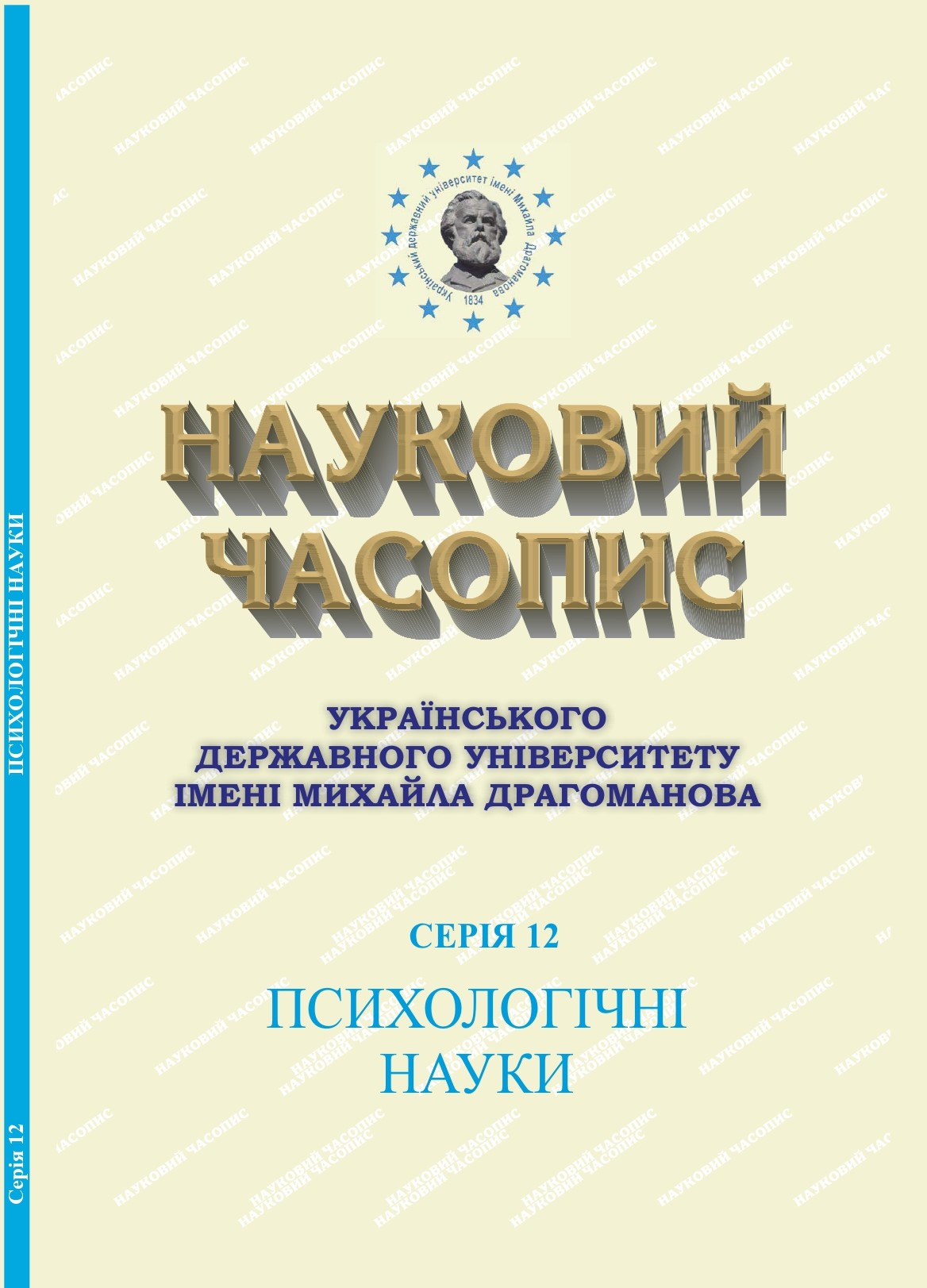PSYCHOLOGICAL CHARACTERISTICS OF HARDINESS AND WELL-BEING OF ADOLESCENTS
DOI:
https://doi.org/10.31392/UDU-nc.series12.2024.25(70).01Keywords:
resilience, psychological well-being, adolescence, war, emotional regulation, social support, self-esteem, stress.Abstract
The article is focused on the theoretical concept of resilience and psychological well-being of adolescents within the context of contemporary events. Based on the research of modern foreign and domestic scientists, the concept of resilience is highlighted. The concept of psychological well-being in general and the significance of this concept for adolescents in the context of military events in Ukraine are considered. Emphasis is placed on adolescence as a critical period of personality development, which involves significant changes at the emotional, social and cognitive levels. It is revealed that during this period, basic psychological characteristics are formed that affect the resilience and psychological well-being of an adolescent. On the basis of foreign and Ukrainian research in recent years, the psychological mechanisms that affect the well-being of adolescents in the context of modern social challenges have been revealed. The article considers such key factors as emotional regulation, social support, family relationships, and self-esteem, which are among the main factors of resilience. Particular attention is paid to the roles of self-regulation and the ability of adolescents to adapt to stressful situations. The components and criteria for the psychological well-being of an adolescent personality, as well as the factors that influence it, are clearly defined. Psychological well-being is viewed as a complex subjective experience that includes: difficult life satisfaction, a sense of happiness, and overriding the positive emotions. The primary criteria for determining psychological well-being include high-quality social and interpersonal relationships, emotional comfort, positive self-perception, and successful self-realization in educational, recreational and creative activities, physical health, as well as successful self-realization of adolescents in educational and creative activities. The article highlights the close connection of resilience formation and the core criteria of psychological well-being. The criteria for social well-being are outlined through the concepts of self-determination and relationships, emphasizing the ability to function optimally in social environments. These include social acceptance, actualization, contribution, integration, significance and realization, as well as involvement in social interactions, strong relationships with loved ones, social approval, a safe environment and the atmosphere of psychological comfort. The article outlines the factors that influence a child’s psychological well-being, such as family upbringing, family microclimate, a pedagogical communication style of school teachers, and relationships within the school community and among peers. It is noted that depending on the child's age, the content of psychological well-being criteria and the significance of certain factors may vary. Finally, the article identifies specific factors that have a significant impact on adolescents’ psychological well-being.
References
- Pidlitkovyi vik – ispyt skladeno [Adolescence – passed the exam] (2021). Buklet Dytiachoho fondu OON (IuNISEF) v Ukraini. Predstavnytstvo Dytiachoho fondu OON (IuNISEF) v Ukraini – Booklet of the United Nations Children's Fund (UNICEF) in Ukraine. Representation of the United Nations Children's Fund (UNICEF) in Ukraine, 4. Retrieved from https://www.unicef.org/ukraine/media/14396/file/Onlain-buklet_pidlitkovyi%20vik.pdf [in Ukrainian].
- Vlasenko, I., Furman, V., Reva, O., & Kaniuka, I. (2022). Psykholohichne zdorovia studentskoi molodi [Psychological health of student youth]. Vinnytsia : TVORY. Retrieved from https://elibrary.kubg.edu.ua/id/eprint/41404/1/Furman_V_Vlasenko_I_Reva
_O_Kanuka_I_PSSM_2022_IL.pdf [in Ukrainian]. - Kashliuk, Yu. (2016). Osnovni chynnyky, yaki vplyvaiut na psykholohichne blahopoluchchia osobystosti [The main factors that affect the psychological well-being of an individual]. S.D. Maksymenko & L.A. Onufriieva (), Problemy suchasnoi psykholohii. Zbirnyk naukovykh prats Kamianets-Podilskoho natsionalnoho universytetu imeni Ivana Ohiienka, Instytutu psykholohii imeni H.S. Kostiuka NAPN Ukrainy – Problems of modern psychology. Collection of scientific works of Kamianets-Podilskyi National University named after Ivan Ohienko, Institute of Psychology named after H. WITH. Kostyuka National Academy of Sciences of Ukraine, 34, 170–186 Kamʼianets-Podilskyi : Aksioma [in Ukrainian].
- Predko, V., & Bondar, M. (2022). Psykholohichni osoblyvosti vzaiemozvʼiazku zhyttiestiikosti ta povedinkovykh kopinh-stratehii osobystosti pidlitka [Psychological features of the interrelationship of vitality and behavioral coping strategies of the adolescent personality]. Naukovi pratsi Mizhrehionalnoi akademii upravlinnia personalom. Psykholohiia – Scientific works of the Interregional Academy of Personnel Management. Psychology, 2(55), 5–13. https://doi.org/10.32689/maup.psych.2022.2.1 [in Ukrainian].
- Chykhantsova, O. (2017). Model zhyttiestiikosti osobystosti [A model of the vitality of the individual]. Instytut psykholohii imeni HS Kostiuka NAPN Ukrainy. Aktualni problemy psykholohii – Kostyuk Institute of Psychology, National Academy of Sciences of Ukraine. Current Problems in Psychology, 17(5), 142–150. Retrieved from https://lib.iitta.gov.ua/id/eprint/709130/2/Chykhantsova_O.pdf [in Ukrainian].
- Diener E., Emmons R.A., & Larsen R.J. (2008). The Satisfaction With Life Scale. Journal of personality assessment, 49(1), 2008, 71–75. Retrieved from https://scholar.google.com/citations?view_op=view_citation&hl=en&user=_
xR5tL8AAAAJ&citation_for_view=_xR5tL8AAAAJ:Oo_WeVVXg5wC - King Laura A., & Emmons Robert A. (1988). Conflict among personal strivings: Immediate and long-term implications for psychological and physical well-being. Journal of personality and social psychology, 54(6), 1040– Retrieved from https://scholar.google.com/citations?view_op=view_citation&hl=uk&user=
sbZm24UAAAAJ&citation_for_view=sbZm24UAAAAJ:qjMakFHDy7sC - La Greca, A.M. (2022). Impact of School Transition Stressors on Hispanic Adolescents’ Symptoms of Social Anxiety and Depression: Repetitive Negative Thinking as a Potential Mediator. European Journal of Education and Psychology, 15(2), 23–41. https://doi.org/10.32457/ejep.v15i2.1968
- Maddi, S.R., & Koshaba, D.M. (2005). Resilience at work: how to succeed no matter what life throws at you. New York : AMACOM.
- Maddi, (2004). Hardiness: An operationalization of existential courage. Journal of Humanistic Psychology, 44, 279–298.
- Maddi, (1999). The Personality Construct of Hardiness: Effects on Experiencing, Coping and Strain. Consulting Psychology Journal: Practice and Research, 51(2), 83–94.
- Saija,, Ioverno, S., Baiocco, R., & Pallini, S. (2022). Children experiencing sadness: Coping strategies and attachment relationships. Current Psychology, 42, 14474–14483. https://doi.org/10.1007/s12144-022-02771-2
- Hall, G.S. (1904). New York: Appleton-Century-Crofts; D. Appleton and Company. https://doi.org/10.1176/ajp.61.2.375

